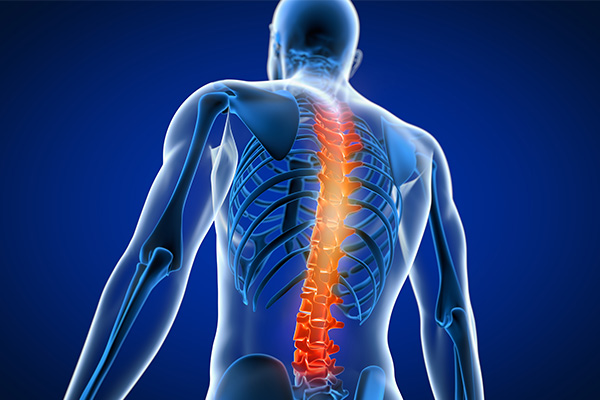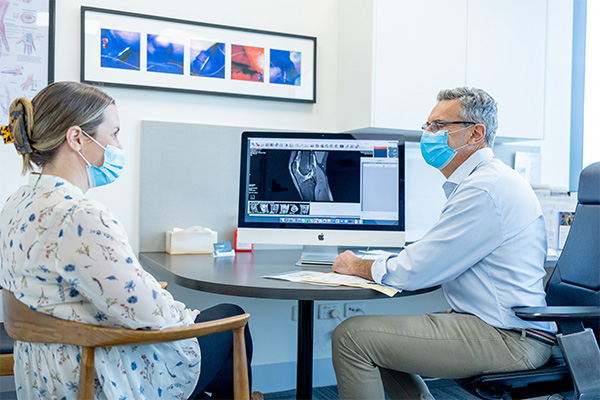Overview
Epworth orthopaedic spine surgeons and neurosurgeons perform many different back and spine procedures to treat various conditions. We support our patients and their families at all stages, from diagnosis to special education clinics before treatment and rehabilitation programs to prepare for surgery or support recovery.
-
What is chronic neck and back pain?Back pain is a common problem experienced by many people at some point in their lives, and chronic back pain is defined as lasting more than three months. Depending on your condition, back and neck pain can produce different sensations, such as weakness, constant dull pain, sharp pain or numbness.
-
Will I have a neurosurgeon or orthopaedic surgeon?
Both neurosurgeons and orthopaedic surgeons operate on the spine. Orthopaedic surgeons and doctors focus on musculoskeletal conditions such as arthritis or sports injuries, while neurosurgeons tend to specialise in conditions of the brain, spinal cord, and nerves.
Though neurosurgeons and orthopaedic surgeons specialise in different areas of the back and spine, they often work together to achieve the best patient outcome.
-
When is spine or back surgery recommended?If you have persistent back or neck pain from trauma or a pre-existing condition and find it difficult to do everyday activities. In that case, your doctor may recommend surgery to increase mobility and reduce pain.
-
Can my pain be treated without surgery?Unless you have experienced a severe spinal cord injury, you likely won’t be recommended surgery unless other treatments haven’t reduced your symptoms. We encourage you to consult your GP if your condition has worsened or the level of pain or reduced mobility has impacted your quality of life.
-
What could happen if my condition is left untreated?Your doctor may recommend surgery or pain management treatment depending on your condition. If left untreated, you may experience permanent disability or ongoing pain. If you are experiencing persistent back pain, we recommend you speak with your doctor as soon as possible.
Conditions
Common conditions and injuries which may require surgery.
-
Herniation discAlso known as a bulging or ruptured disc, a herniated disc typically occurs in the lower back. The term disc refers to the cushions that separate the bones of the spine, and a herniated disc occurs when the contents of the disc cushion are pushed out due to injury or ageing.
-
SciaticaSciatica is pain experienced in the sciatic nerve and can be caused by a herniated disc, pinched nerve, or arthritis. The sciatic nerve starts in the lower spine and travels down the hips and legs, causing a tingling, painful or numb sensation.
-
ScoliosisScoliosis is an abnormal curvature of the spine. Though scoliosis itself is painless, the normal age-related degeneration of the spine may lead to experiencing pain throughout the day.
-
ArthritisSpine or neck arthritis can cause pain and stiffness. The most common type of spinal arthritis is osteoarthritis, followed by rheumatoid arthritis and spondylarthritis.
-
Spinal tumoursTumours are abnormal growths that can be cancerous or non-cancerous. Tumours may be found in the spinal cord or base of the skull, and symptoms may include persistent back pain, numbness, and loss of sensation across the arms and legs.
Diagnosis
Orthopaedics at Epworth has dedicated teams of nursing, medical and allied health staff to expertly manage all orthopaedic conditions. This is supported by radiology services, including MRI and CT scans.
Evaluation
Once you have received a referral from your GP, you will be able to book an appointment with an Epworth specialist. Your specialist will then assess your X-rays, medical history, and physical exam to provide personalised treatment options.
Medical imaging
- During the early stages of investigating your back pain, your doctor will likely arrange X-rays or Magnetic Resonance Images (MRIs) images to examine your spine.
Medical history
- Your specialist will ask you questions about your ability to perform everyday activities, pain level and general health.
Physical exam
- During your consultation, your doctor will perform a physical exam to assess your mobility and strength.
Fees
When booking an appointment with your specialist, you can speak with their administrative team to understand the fee for the consultation. We then recommend speaking with your insurance company to determine your out-of-pocket costs.
Treatment
Depending on a range of factors, your doctor will advise which type of treatment or surgery is best for you.
Spine and neck treatment examples:
-
Non-surgical interventionsIf you’ve only just started to experience back or neck pain, your doctor will recommend non-surgical interventions to manage or reduce pain. For example, your doctor may recommend, rest, low-impact exercise, maintaining a healthy weight or quitting smoking. Physical therapy and rehabilitation may also be suitable to help you manage the symptoms associated with your condition. If non-surgical treatment is no longer reducing your symptoms, we encourage you to speak with your doctor about alternative options.
-
Lumbar spine surgeryLumbar spine surgery treats nerve pain or numbness in the lower back and legs.
-
Lumbar decompressionLumbar decompression, also known as spinal decompression, includes microdiscectomy, laminectomy and laminoplasty. These types of surgeries aim to relieve pressure on your nerves.
-
Lumbar fusionLumbar or spinal fusion is a procedure that joins two or more of the vertebrae in your spine to improve your spine’s stability and reduce back pain.
Deciding whether surgery is right for you
The decision to undergo back or spine surgery is a collaborative one. We encourage you to speak with your family, GP and orthopaedic surgeon. The more you know, the easier it will be to decide whether this surgery is right for you.
Fees and private health
Once you speak with your specialist, you’ll be provided with the relevant information to give your insurance company. Your insurer will provide you with the breakdown of treatment costs.
Find your Epworth specialist
Our locations
Back and spine treatment locations:
Preparing for surgery
We are here to support patients and their families in preparing for surgery.
Pre-admission videos/modules
We encourage you to view the videos below, which outline the patient journey to give you the confidence to be an active participant from your pre-operative exercise program through to your return home and post-surgery recovery.
To learn more about your anaesthetist's role during the surgery and what to expect beforehand, watch the video below.
Home preparation
Occupational therapists recommend you review your home environment and implement simple modifications, moving trip hazards such as rugs and cords from walkways to ensure your home is safe following your surgery.
Rehabilitation
Epworth Rehabilitation programs aren’t just something to consider after surgery. Our rehabilitation programs can also support people preparing for joint replacement or ligament surgery.
Ordering assistive aids
Recovery
Our aim is to provide you with comprehensive and compassionate recovery care that will help you return to an independent and functional lifestyle as possible.
The day after your surgery
We are here to support you to get back to your life as soon and as safely as possible. Your care team will often try to get you moving the day after your operation. This will support your recovery and reduce the likelihood of complications, so you can book your next holiday, get back to playing sport, or return to work sooner.
Physiotherapy
Your physiotherapist will assist you in completing a daily walking and exercise program. The planned exercises aim to restore the range of movement and muscle strength.
Pain management
It is normal to have some pain following major surgery. By controlling your pain as best we can, you are likely to recover faster. The team caring for you will offer you medications to manage your pain, enabling you to participate in your walking and exercise program. It is important to be proactive in asking for pain relief. As your pain improves, you will gradually require less pain medication. You will be supplied with pain relief medication on discharge.
Rehabilitation
Depending on your personal needs and GP or surgeon’s recommendations, you may be referred to a rehabilitation program.
How rehabilitation supports your recovery
Guided by Epworth physiotherapists and occupational therapists, rehabilitation will help you to feel stronger, safer and more confident to participate in everyday life activities.
To learn more about what you can expect from your rehabilitation program, please watch the video below.
Rehab after your joint replacement surgery
Achieve your post-surgery goals
Our rehabilitation team will assess and develop a specific rehabilitation program based on individual needs and goals. Your program will consider factors such as pain, arthritis, movement, and personal goals such as returning to work or sport.
Rehabilitation programs
There are a few ways you can access our rehabilitation programs. Your surgeon and care team will work with you to identify the best option:
Rehabilitation at home
- A physiotherapist will visit you at home and develop a program you can complete in your local area. Our team will also connect you to local services such as gyms and pools if it benefits your recovery. The team will also recommend equipment you may like to purchase or hire to support recovery and long-term health.
Outpatient program
- Outpatient program involves visiting the hospital a few times a week to complete your rehabilitation program.
Inpatient program
- If you are recommended an inpatient program, you will stay in our rehabilitation hospital for about 5-7 days after your surgical admission.
Why choose Epworth for rehabilitation?
Epworth Rehabilitation offers patients access to an expert team of rehabilitation clinicians with purpose-built gymnasiums, hydrotherapy pools and other specialised rehabilitation equipment to support you.
Fees and health insurance
Depending on the level of your private health insurance, our rehabilitation services may be covered by your health fund. You can also choose to self-fund if you prefer. Whichever option you choose, we will provide you with the financial information when you are referred to Epworth Rehabilitation.


